Community
Broadbasing our impact
We aim to uplift the marginalised communities through impactful projects, driving growth and prosperity. Pehel Foundation, our CSR wing, spearheads initiatives aimed at their holistic development. We are committed to extending our reach to empower underserved populations and enhance their quality of life.
Focus areas
As a company specialising in housing finance, our primary CSR commitment centres on three segments.
- Flagship initiatives aimed at the comprehensive welfare of construction workers, the migrant community, unorganised sector, and their associated communities.
- Our CSR efforts are organised into four strategic thematic programmes:
- PEHEL WOMEN EMPOWERMENT
- PEHEL EDUCATION
- PEHEL HEALTH
- PEHEL ENVIRONMENT
Each of these programmes is designed to address specific needs within these communities, ensuring targeted and effective interventions.
We have also included a contingency pillar within our CSR framework, designed to support community efforts in disaster mitigation and response.
We have strategically opted to implement our CSR activities across India, focusing specifically on areas within a radius of our branches. This targeted geographical approach ensures that our CSR efforts are aligned with local needs and directly benefit the communities surrounding our operations.
Our CSR strategy
We firmly believe that businesses should be oriented towards society. We see our stakeholders as more than just our customers and associates; they include the community that invests their social and manual resources.
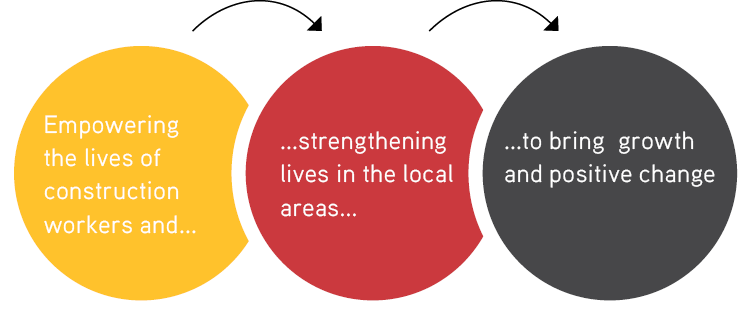
Flagship intervention: welfare construction worker community
A total of 71,333 beneficiaries have directly benefited under our flagship intervention, and an additional ~1 lakh beneficiaries (dependents) have also benefited indirectly.
HEALTH
Mobile Medical Unit (MMU) by ATNF
We aim to deliver doorstep primary healthcare to targeted communities, conducting screenings for NCDs like cancer, diabetes, hypertension, malnutrition, and anaemia. Additionally, we raise health awareness through effective camps. So far, our efforts have reached 15,670 people from construction worker communities in Chandigarh, Lucknow, Jaipur, Indore, Pune, Hyderabad, Bangalore, and Thiruvananthapuram through Apollo Telemedicine Networking Foundation (ATNF) services.
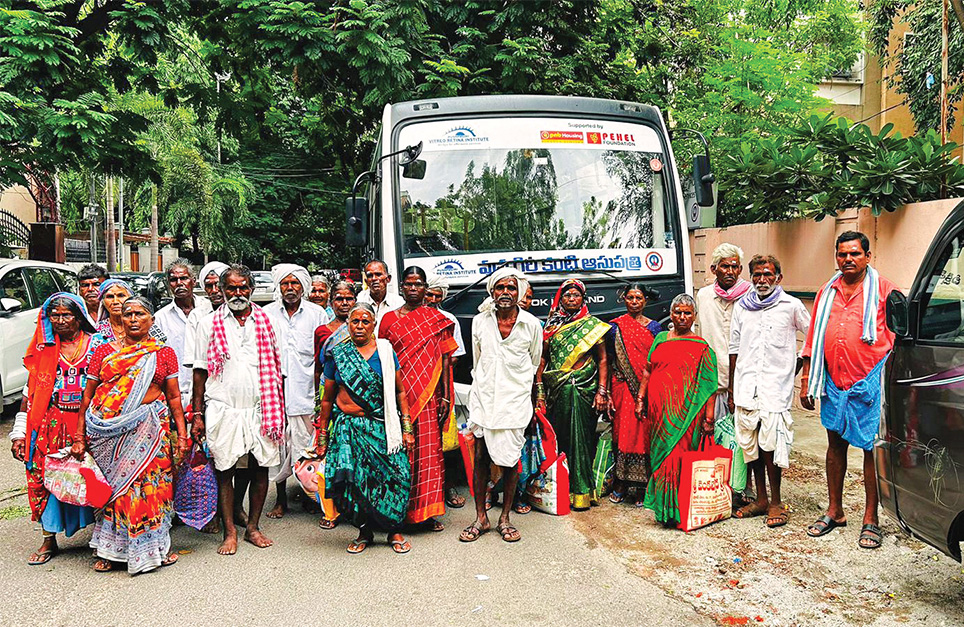
Mobile Medical Unit (MMU) by Wockhardt Foundation
The Pehel Foundation-supported Mobile Medical Unit (MMU) project aims to deliver healthcare directly to construction workers, promoting health awareness and modern healthcare-seeking behaviour. This initiative conducts regular health camps and utilises mobile medical units to provide services, medications, and screenings. Operational in Delhi, Mumbai, Chennai, and Kolkata six days a week, each van typically serves 75-80 patients daily, reaching 52,499 individuals. Of these beneficiaries, 12,744 were female, and 39,755 were male. Additionally, 1,886 beneficiaries received referrals to specialist health centres/hospitals for further diagnosis and treatment, addressing conditions requiring specialised intervention. This initiative empowers underprivileged communities with accessible healthcare, fostering better health outcomes and awareness.
Scheme for Construction Industry workers at NIMHANS
We have assisted 311 patients with psychiatric, neurological, or neurosurgical conditions at NIMHANS in Bangalore. The treating team, including physicians or social workers, evaluated those unable to afford treatment costs. Eligible patients, dependent on construction workers and financially disadvantaged, were recommended for scheme enrollment.
Eye Mitra Project (PVRI)
A total of 2,014 construction workers community had their eye checked. A total of 872 people corrected their visual issue with spectacles, and a total of 1,665 people restored their sight after treatment of cataract and cornea issues.
We also provided safe accommodation facility for 100 construction workers in Bangalore.
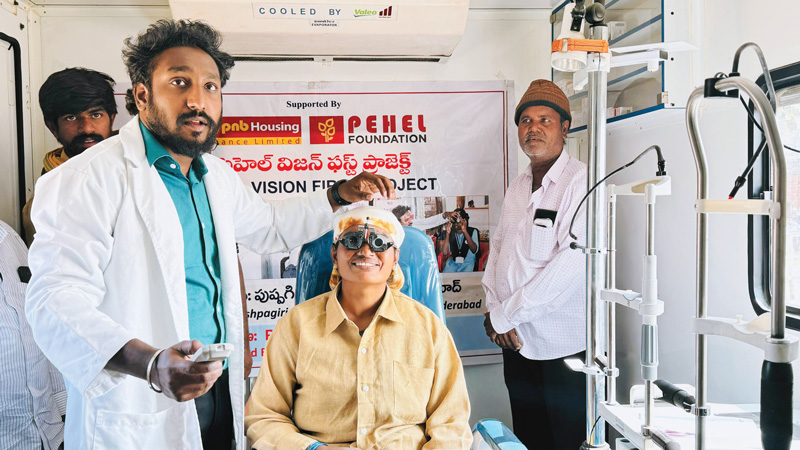

WOMEN EMPOWERMENT
Skill development of dependents of construction workers
We have empowered 240 women in Haryana's construction worker communities with tailoring and fashion designing skills, achieving a 98% job placement rate. This NSDC-certified course offers initial salaries of `10-12K, rising to `15-18K after one year. Our aim is to bridge income gaps by providing employment-linked skills.
Moreover, 30 children of these women have completed bridge education programmes, which prepare them for mainstream schooling. These centres also offer focused attention on their nutrition, physical, and mental well-being.
Khandsa in Gurugram is populated with migrant construction workers and many reputed garment export and apparel industries that are in high demand of manpower. This project has knitted the need and provision through an integrated approach to make women economically independent.

EDUCATIONAL SUPPORT
PROTSAHAN scholarships in collaboration with TISS:
Providing scholarships totalling `1 crore to support 421 students from low-income families engaged in construction-related trades.
Education for out-of-school children
We are supporting 48 children aged 5 to 14 from construction workers' families at a construction site in Gurugram by providing education.
STRATEGIC THEMATIC PROGRAMMES PEHEL SHAKTI
Objective
Empowering women with diverse backgrounds through skill development, entrepreneurship and supportive services to enhance their economic independence and overall well-being.
2,057
Women directly benefited by the CSR projects;
with an additional 2,925 indirect beneficiaries (dependents)
Empowering women with hearing impairment through specialised technical training:
Across four state chapters, 423 hearingimpaired women received tailored technical and non-technical training, including mobile, LED, and home appliance repair. Many secured jobs or pursued self-employment, showcasing empowerment.
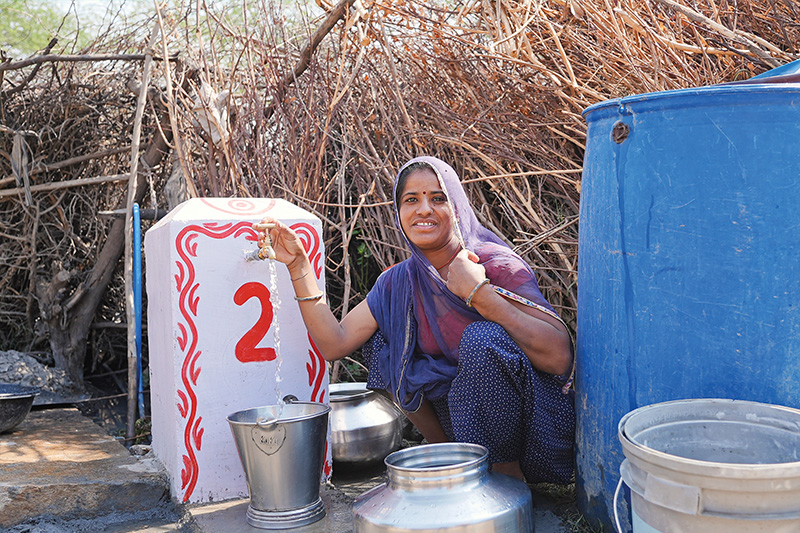
Millet cookies production unit:
In Rajasthan, we engaged 50 marginalised women in a millet cookies enterprise, aiming to uplift livelihoods and empower women through training and market strategies.
Blended spice production unit:
Another group of 50 women in Rajasthan were engaged in a blended spices enterprise project, with an aim to improve their socioeconomic status and entrepreneurship.
Community drinking water project:
In Udaipur, Rajasthan, we provided safe drinking water to 3,174 people, including tribal and marginalised communities, with pipe water connections and water troughs for animals and birds.
PEHEL SHIKSHA
Objective
Elevate educational quality and accessibility through infrastructure improvements, technology upgrades and targeted support programmes across multiple regions, benefiting students, parents and educators.
51,096
students have directly
benefited with
an additional
18,805 indirect beneficiaries
(dependents)
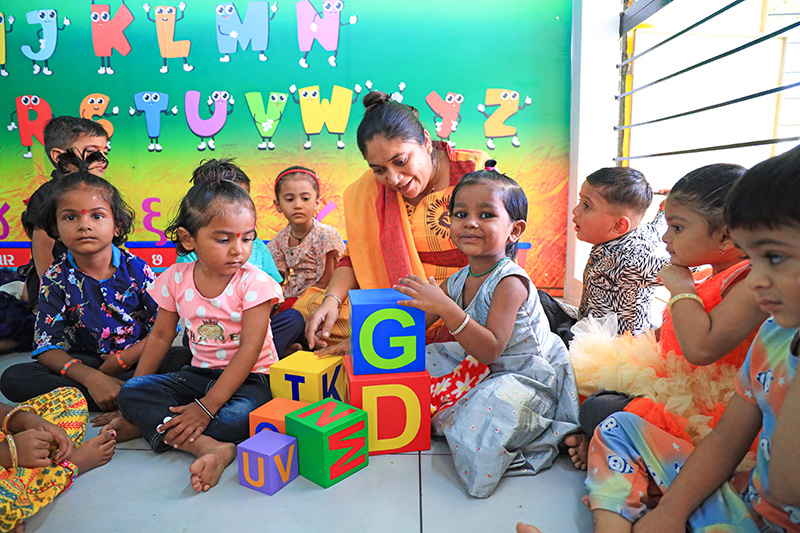
Anganwadi upgrades and repairs
We enhance anganwadi services to reduce infant mortality rates and improve maternal health. We upgraded five centres into PEHEL Smart Anganwadis in Rajkot, Gujarat, and repaired 22 centres in Bangalore, benefiting 1,325 beneficiaries comprising children and women.
STEM education
We conducted STEM education sessions in 20 schools, totalling 218 visits and 654 sessions, benefiting 3,798 students of classes VI, VII and VIII. STEM education fosters creativity and critical thinking, with teacher training enhancing educators' skills in AI and robotics for dynamic lessons.
Support services for education
School transportation
We ensure daily commute to and from school for needy students in remote Dehradun areas. A school bus supports 200 beneficiaries, including 170 students and 30 teachers.
Resources provided
Tribal schools in Jharkhand received 38 computer systems, 4 printers, solar panels, and a school bus benefiting 1,080 students and teachers.
Renovation
We painted and renovated 16 classrooms and two toilets at a Mumbai school, impacting 880 students.
Educational technology and resources
We installed digital infrastructure in 40 classrooms, with content fully uploaded, reaching 2,602 students and 54 teachers across 20 schools in Indore and Bhopal.
PEHEL SWASTHYA
Objective
To enhance the well-being of diverse populations by providing comprehensive medical services, advanced treatments, and essential health supplies.
98,124
Direct beneficiaries and 85,606 indirect beneficiaries dependants
Medical support
We provided comprehensive medical, nursing, nutritional and psychosocial assistance to 2,026 beneficiaries, including patients and caregivers. This intervention included 6,126 clinic visits across two outpatient clinics and a mobile clinic for cancer patients. The project aims to provide factual information, mobilise resources, and alleviate suffering associated with cancer journeys, from diagnosis to advanced stages.
Cochlear implant surgery
We successfully conducted cochlear implant surgery for 10 children and provided cochlear implant sound processor support for 20 children, resulting in improved hearing abilities, communication skills, sound perception, and academic performance.
Primary health centre strengthening
We refurbished and equipped two health centres in Karnataka to enhance primary healthcare services, ensuring 24/7 delivery facilities, uninterrupted power supply, and quality immunisation through cold chain maintenance.
Eye screening camps
We organised regular eye screening camps, performing 2,500 free cataract surgeries for patients from underprivileged families, focusing on eradicating avoidable blindness.
Wheelchair distribution
We distributed 200 wheelchairs to identified old-age homes across locations like Ahmedabad, Surat, Bhopal, Vijayawada, and Raipur, enhancing mobility and accessibility for elderly individuals.
Support for elderly and intellectually disabled
We provided medical equipment and aids for around 650 abandoned elderly and intellectually disabled individuals living in an old-age home in Gurugram, ensuring their well-being and care.
AI device distribution
We distributed AI devices for 55 visually-impaired individuals in Chennai, enhancing accessibility and quality of life.
Medical equipment support
We provided medical equipment support to benefit approximately 600 severely sick children from economically disadvantaged families in the Sick Newborn Care Unit (SNCU).
PEHEL PARYAVARAN
Objective
Achieve significant reductions in environmental challenges and enhance climate resilience throughout our communities.
1,32,756
Direct beneficiaries and 11,750 indirect beneficiaries dependants
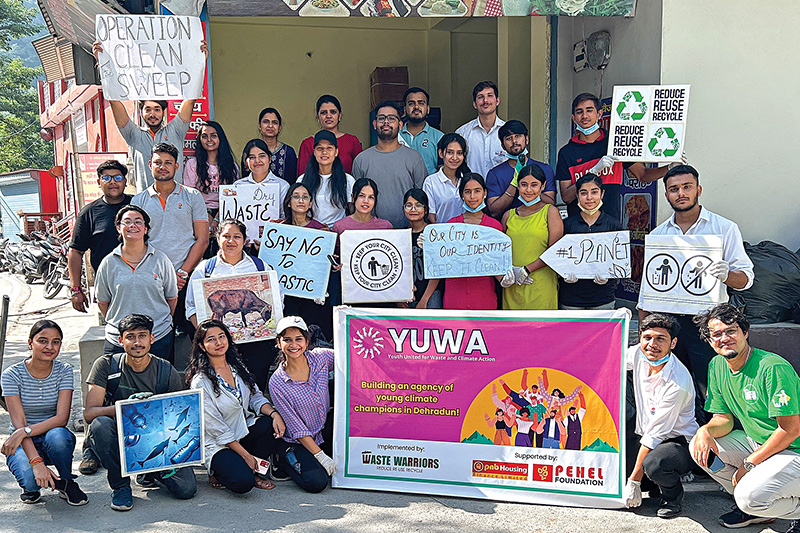
Waste management
Plastic waste management
We installed 16 plastic bottle crushers in Mumbai, aiming to crush and recycle 1.1 million PET water bottles annually, reducing landfills and boosting recycling rates. 1.2 lakh individuals used the machine and collected 1,433.08 kilograms of waste.
MRF upgradation
We upgraded the Material Recovery Facility (MRF) in Dehradun, expanding the shed area from 5,000 sq ft to 9,000 sq ft, thereby increasing the processing capacity of collected waste from 2 to 3.5 tonnes daily.
Renewable energy
Solar electrification
In four villages, we provided electricity to community areas like primary health centres (PHCs) and schools and installed street lighting, benefiting 12,000 villagers. Additionally, we installed solar electrification plants at care homes for older adults and schools.
Environmental conservation
We aim to plant 22,000 trees in Hyderabad and Chennai, with 6,000 plants planted.
Water resources management
We are targeting the harvesting of 75 million litres of groundwater through the recharge of 50 borewells in the villages of Nashik.